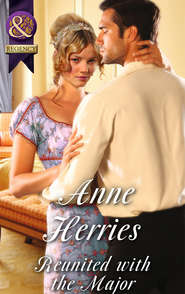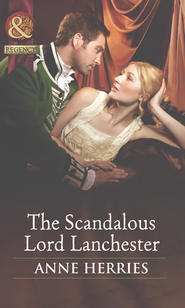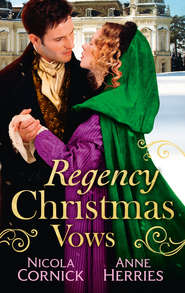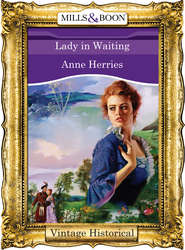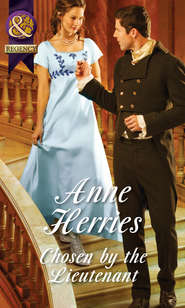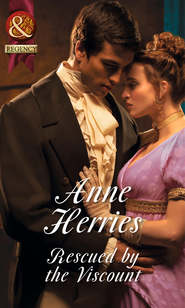По всем вопросам обращайтесь на: info@litportal.ru
(©) 2003-2024.
✖
A Regency Lord's Command: The Disappearing Duchess / The Mysterious Lord Marlowe
Настройки чтения
Размер шрифта
Высота строк
Поля
‘It was merely an idle question,’ he said. For a moment his eyes dwelled on her, as if questioning or searching for answers he could not find. ‘Everything is ready for this evening. You should rest while you can, Lucinda. You will not wish to be tired this evening.’
‘I shall not tire myself, Justin. However, I wish to see for myself that everything is as it ought to be. This is our first ball and I want everything to be perfect for your friends.’
‘I hope they will be your friends too, Lucinda,’ he said, frowning as he went out.
She sat down at her dressing table, her heart racing. Why had Justin been waiting for her to return? Could he have discovered her secret?
She might have to tell him soon, but not yet. If they quarrelled again before the ball, it would create an atmosphere. She must wait until after this evening and then perhaps she would confess her secret. If Justin understood why she went for a walk every day, he might not be so suspicious.
Guests began arriving soon after eleven that morning. Justin had advised Lucinda to rest, but since he had gone riding alone and not returned, she was left with the duty of greeting his friends and arranging for them to be shown to their rooms.
‘Some of his Grace’s relatives have special rooms that are kept for their use,’ Mrs Mann had told her a few days previously. ‘And other friends like to be put at the rear of the house rather than the front, but I have a list of accommodation for you to approve.’
Lucinda glanced at the list. ‘I have no fault to find, but I would like to see the rooms once they are ready, just in case anything else is needed.’
At the start the housekeeper had been disapproving, but she was gradually warming towards Lucinda. When she had suggested that there should be flowers in all the guestrooms, brandy for the gentlemen, wine and sweetmeats for the ladies, her housekeeper had smiled and agreed.
‘They are the kind of things that guests like to find in their rooms, because it saves them asking for extras to be brought. Some people ring their bell for service all the time, but others do not like to seem too demanding.’
‘I think it is nice to have something at hand in that time between going up to your room and dressing for the evening—and before bed. So if all the rooms are supplied earlier in the afternoon, it will save the maids having to run upstairs a dozen times before dinner.’
‘That is thoughtful of you, my lady. I suppose you have not had the time to consider what should be done for the attic rooms?’
‘I need a little more time to consider.’
Lucinda had put the matter to the back of her mind, because the ball was more pressing and Angela had seemed fairly settled at the cottage. She still cried when her mother left her, but she was becoming less clinging, growing used to the idea that her mother came and went each day.
What would she do if Justin decided to take her to Paris or perhaps London? It was bound to happen in time. Lucinda could only hope that by the time he was ready for such a visit her daughter would be happier, content to stay with Nanny.
With the arrival of her guests, Lucinda had no time to give her daughter more than a passing thought. She was constantly greeting people, many of whom she had never seen before. It was a relief when Justin returned at noon and apologised for leaving her to cope alone.
‘I managed well enough. However, I am sure your guests will be pleased to see you.’
‘Our guests, Lucinda,’ he reminded her. ‘You are the hostess here, my dear.’
‘Yes, of course.’
Jane and Andrew Lanchester did not arrive until the early evening, when everyone was gathering for the ball. The guests who were staying had been served high tea and given sandwiches, lemon barley, brandy and wine in their rooms. A lavish supper would be served at about ten and the dancing began at seven.
Everyone was excited when they took off their cloaks, exclaiming over each other’s costumes. Jane was wearing a flowing green gown, because she said it was the true colour for witches. She wore her long dark hair loose about her face and a pendent of lapis lazuli about her neck
‘The lapis has magic powers,’ she said with a smile. ‘I am, of course, a white witch and use my magic only for good—some of your other guests look more sinister.’
Their guests had various ideas of what a witch or wizard should look like. Most of the men had chosen black and taken what could only be described as a medieval theme, wearing tight hose and tunics that fitted to the waist or fell in loose folds to mid-thigh, depending on their age and stature. The ladies were less adventurous, though several had dressed in flowing medieval style gowns similar to Jane’s. One lady had very long nails, which she had dyed with a green colour that looked very effective; some wore a velvet mask, and others had a pointed hat, which they soon discarded.
Andrew Lanchester had come dressed as a medieval knight. He grinned at Lucinda as he saw that she was wearing a green-and-white gown with fronds, which fluttered like leaves of silk, hanging from an embroidered band beneath her breasts. On her head she wore a tiny skullcap of gold threads.
‘I think you must be the Queen of the elves,’ he said. ‘I am Sir Lancelot and I’ve come prepared to rescue any ladies in danger of being enchanted by these wicked wizards.’
Lucinda laughed. ‘I am not sure that any ladies are in danger at the moment,’ she said. She glanced at her husband, who was wearing a green-velvet tunic that fitted into his waist and then flared out in little pleats, his tight-fitting hose in a matching shade. He had a little fringed cape of black silk and beads that fell in a point over one shoulder. Again it was the medieval style, but had something of an elfish look. ‘I am quite disappointed that no one dressed up as a troll to frighten us all.’
‘I doubt that anyone was certain of what a troll should look like,’ Andrew said. ‘I do not believe I have ever met one—what does a troll do, do you imagine?’
‘He or she lives under a bridge, eats rotten fruit, has exceedingly bad manners and is very aggressive,’ Lucinda replied laughingly.
‘Indeed?’ Andrew raised his right eyebrow. ‘I believe I have met one or two after all, but they do not appear to be here this evening. Clearly, you had the good sense not to invite them.’
‘Trolls need no invitation,’ Lucinda said. ‘Perhaps it is as well that they have decided to stay away.’
The servants were circulating with trays and people helped themselves to glasses of champagne. To give the ball an atmosphere, Lucinda had asked the servants to hang banners of green-and-black silk, from which dangled little spiders, toads and black cats, which she had made herself from paper, ribbon and scraps of velvet. Justin had discovered a beautiful crystal ball, which had been set in the middle of a display of prickly holly, some white lilies and little dishes of biscuits in the shapes of witches, wizards, toads and black cats.
Outside the ballroom there were lanterns hung in the trees and Lucinda had painted silhouettes of witches, wizards and black cats on the glass so that when it got dark they would throw shadows onto the lawns. There was to be a firework display at the end of the evening, which the gardeners had been busy setting up all day, and the guests would watch from the safety of the veranda.
Lucinda and Justin opened the ball together. Everyone smiled and applauded them as they performed alone for a few minutes, then gradually other couples joined in and soon everyone was dancing. As soon as Justin released her, Lucinda was besieged by gentlemen wishing to dance with her.
‘This is a jolly fine evening, duchess,’ one rather portly gentleman told her. ‘These clothes are a deal more comfortable than the tight breeches they make us wear these days.’
‘You make an excellent wizard, Sir John,’ she said and smiled at her husband’s cousin. ‘I am so glad you are enjoying yourself.’
‘I can’t recall when I’ve enjoyed an evening more. Your decorations are enchanting—naïve and different. Justin tells me you did it all yourself?’
‘Yes, I thought it would be amusing. I copied the silhouettes from a children’s book I found in the nursery.’
‘Well, I like it better than some of these fancy affairs they hold in London where everything is so formal and professional—there is a bit of fun about what you’ve done, m’dear. Not enough of it about if you ask me. Justin is a lucky dog.’
‘How kind of you to say so, sir.’
Since his remarks were more or less what everyone was saying, Lucinda felt relieved. She had not had time to send to London for professionally made decorations, but had enjoyed making them herself.
‘You were always good at drawing,’ Jane said when they spoke later. ‘I was thinking we might employ a designer for our Christmas ball this year, but I think I shall not bother. Perhaps you will help me decide on something pretty to decorate our ballroom?’
‘I shall be delighted to,’ Lucinda said and smiled as Andrew came towards them. ‘I was a little anxious—I did not know I was expected to have a theme until your brother mentioned it, but everything has turned out well.’
‘I believe this is our dance, Duchess?’
‘Yes, I believe it is,’ Lucinda said and offered her hand.
It was their second dance that evening. Andrew had marked her card twice at the beginning and their first had been a waltz. This was a more lively country dance and she was soon laughing up at him as they threw themselves into the fun of it.
She was enjoying herself and it was not until the end of their dance, when she left Andrew to circulate and make sure that all her guests were having a good time, that she noticed Justin staring at her.
She inclined her head and smiled at him. His look was neither hostile nor angry, but rather puzzled, a little whimsical, as if he were trying to make up his mind about something.
She wondered what he was thinking. He had opened the dancing with her and she’d seen him dance with Jane Lanchester and one or two of his relatives, including Sir John’s wife, but mostly he seemed content to move about the room, engaging his friends in conversation.
He approached her at supper and asked if she were having a pleasant evening.
‘Yes, Justin,’ she said and smiled without restraint. ‘I think it has all gone well, do you not agree?’






